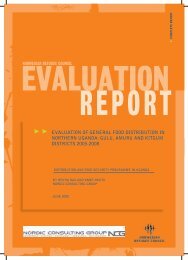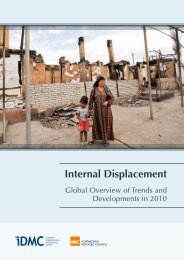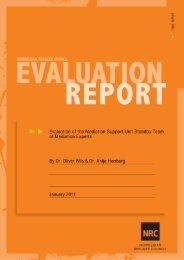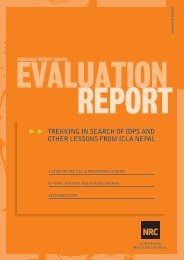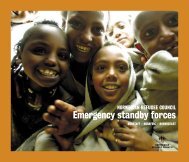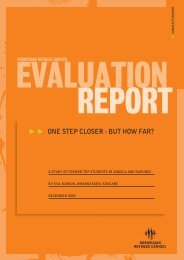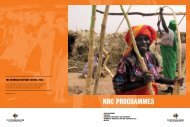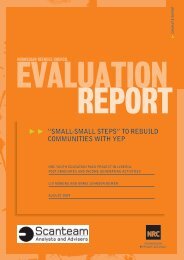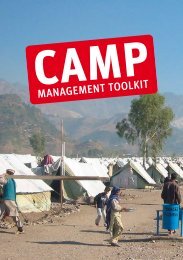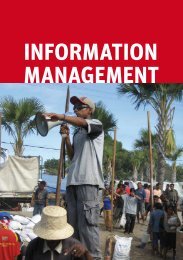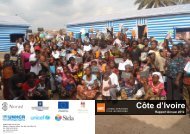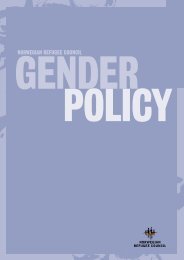Download report here - Norwegian Refugee Council
Download report here - Norwegian Refugee Council
Download report here - Norwegian Refugee Council
You also want an ePaper? Increase the reach of your titles
YUMPU automatically turns print PDFs into web optimized ePapers that Google loves.
Evaluation of NRC Food Security and Livelihoods Projects in Chiredzi and Chipinge Districts of ZimbabweSummary of problems identified by beneficiaries:‣ Borehole problems involving too many people using a limited source and one breakdown. Thebreakdown was sorted by collectively paying for a repair but other issues remain unresolved.‣ Pest and disease problems. Chemicals provided were seen as not being strong enough. Problemswere tackled by buying pesticides, using locally produced ones, using sprays provided by NRC, andeven using surf powder.‣ Lack of availability of fertilizers.‣ Shortages of tools, e.g. wheelbarrows, hoes and rakes.Key RecommendationsConsider providing separate boreholes for community use and LIG use in areas w<strong>here</strong> demandfor water is most intense. This would relieve pressure on LIG use of boreholes, and theenhanced community gains from the project may further improve community relationships.Improve timing of garden establishment / planting to reduce pest and disease problems, andconsider promoting natural approaches to pest control which reduce / do not require thepurchase of chemical inputs (e.g. permaculture).Consider increasing the number of tools / equipment distributed.5.5 Market Linkages / Partnerships with the Private SectorPrivate sector partnerships can have considerable benefits in both adding expertise, resources, andsustainability to projects. The partnerships with ARDA Seeds and Global Agricultural services weregenerally positive in establishing market linkages and enabling beneficiaries to access credit for inputs(e.g. accessing seeds or point-of-lay chickens, to be paid for once output was achieved.)Overall, 98.9% of farmers regarded the project as “good” (19.6%) or “very good” (79.3%) at helping themto market their produce. However, t<strong>here</strong> were clear issues with NRC and ARDA Seeds both feeling thatthe other had failed to fulfil commitments made during discussions held at the start of the project. Fulldetails are in Appendix 3. Similar issues arose regarding payment arrangements for farmers by ARDAin return for sorghum seeds. These issues highlight the need for a clear MOU / formal agreement withprivate sector partners to ensure both sides are aware of and abide by their commitments. T<strong>here</strong> werealso technical issues, related to farmers harvesting too early / too late and planting to early (at firstrains), and inadequate fertiliser application. This, combined with adverse weather conditions resulted indepressed yields. Only 98 farmers delivered sorghum seed to ARDA Seeds Company out of the 588that were supported to grow it, due to yields being affected by drought and delayed collection of theseed by ARDA which resulted in some households consuming the seed before collection took place.Beneficiaries felt that marketing training would have helped them to market their produce without NRChelp, but that this was not provided because NRC had already arranged the marketing.Summary of problems identified by beneficiaries:‣ Problems drought, with one having to replant.‣ Pest problems, including birds.‣ shortages of seeds, or late arrival of seeds. Solutions used included raising money or borrowingmoney to purchase seeds.‣ Shortages of tools, labour, chemicals and pesticides, with one recipient selling a goat in order to buychemicals.‣ Problems transporting produce / inputs to/from markets..‣ Amongst the layer chicken rearers, deaths and illness were the most commonly <strong>report</strong>ed problem.Seeking help from the animal health adviser, or using traditional treatments were the most commonresponse. Some layers were not laying well, and some complained that the birds were too old.11




